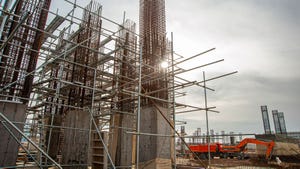Switch to Apply the Pandemic’s Lessons in Efficiency Permanently
Management plans to make some of the pandemic-forced changes, which meaningfully increased profit margins, permanent.

Like other data center providers, Switch saw meaningful business cost reductions forced by the pandemic, resulting from things like inability for its staff to travel and the absence of physical conferences to sponsor or attend.
These lower costs have resulted in a slightly wider adjusted EBITDA margin for Switch so far this year (just under 1 percentage point higher year to date). And company management plans to make some of the pandemic-induced operating changes permanent even after the global COVID-19 crisis is over.
The company managed to meet the revenue trajectory it had expected for the year so far, and the expanded margin enabled it to raise its earnings projection for the year by 3 percent at the midpoint of the projected range (an $8 million difference in adjusted EBITDA).
“We have deployed some software to increase efficiencies, and we have learned to do virtual tours,” Switch CFO Gabe Nacht said on the company’s third-quarter earnings call last Thursday. “We've learned to do virtual conferences; we maintained a flat headcount despite growing significantly in terms of our revenue this year and increasing the size of our footprint, and we expect to carry those efficiencies forward.”
The current margin shouldn’t be considered Switch’s baseline going forward, he warned, since the company would like to eventually go back to traveling to see customers or to attend conferences. But some of the new efficiencies will remain in place for the long term.
Switch reported solid leasing results for the quarter, booking deals with existing and new customers. The company leased a total of 12MW of data center capacity during the quarter, 1.5MW of which came from contracts with 21 new customers.
Its revenue for the quarter was $128.8 million – up 5 percent year over year. Net income was $13.2 million – up from $10.1 million in the third quarter of 2019.
Based in Las Vegas, Switch operates 12 data centers across four campuses in Las Vegas; Sparks, Nevada (next to Reno); Grand Rapids, Michigan; and Austell, Georgia (outside Atlanta).
Thomas Morton, Switch’s president and chief legal officer, highlighted several of the quarter’s new customer wins on the call, including among others one of the largest US health insurers, who took space in Atlanta, and “a leading producer of electric vehicles and innovative battery solutions,” who took space at Switch’s Tahoe Reno campus.
The latter is likely Tesla, whose Gigafactory battery manufacturing plant in Sparks neighbors the data center campus.
While customers in the hard-hit industries held back on new data center deployments this year, there was enough growth among companies whose business the pandemic boosted – companies like CDN providers, for example, or online retailers – to enable Switch to deliver on its pre-pandemic growth projections.
“The ones that did well are helping us meet the numbers that we set out that we would do for the market,” Morton said. “And the ones that were held back a little bit are now coming in and helping us buildup a robust 2021.”
It’s not that their IT needs slowed down during the last eight months or so, he explained. It’s their ability to address their needs that did. “So, we're seeing the relinquishment of that slowdown, and we are seeing an uptick in activity.”
About the Author
You May Also Like







